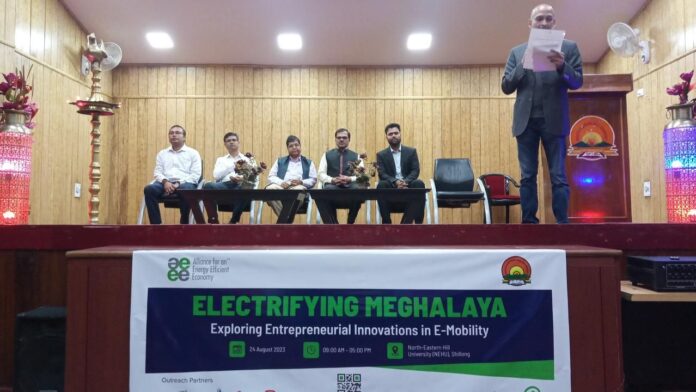SHILLONG:
The Department of Energy Engineering, North-Eastern Hill University (NEHU), Shillong, on August 24, organised a ground-breaking national workshop on ‘Electric Mobility, Innovation, and Entrepreneurship’, aiming to provide a platform for researchers, scholars, industry experts, and stakeholders to delve into the realms of electric mobility and its potential to drive innovation and entrepreneurship, particularly focusing on the context of the state.
The Department of Energy Engineering, North-Eastern Hill University (NEHU), Shillong, on Thursday, organised a ground-breaking national workshop on ‘Electric Mobility, Innovation, and Entrepreneurship’, aiming to provide a platform for researchers, scholars, industry experts, and stakeholders to delve into the realms of electric mobility and its potential to drive innovation and entrepreneurship, particularly focusing on the context of the state.
The workshop initiated a dialogue on the multifaceted advantages of electric mobility beyond environmental considerations, and shared information of the challenges that lie ahead.
Professor Prabha Shankar Shukla, Vice Chancellor of NEHU who was present at the event as the chief guest, highlighted the transformative potential of electric mobility to shape economies and societies, emphasising energy independence and economic growth through innovation and job creation.
Shukla stated, “The insights shared in this workshop will undoubtedly shed light on innovative solutions to these challenges. The reduction in tailpipe emissions contributes to improved air quality, leading to healthier cities and a lower burden of respiratory illnesses. Additionally, the shift towards electric vehicles plays a pivotal role in mitigating climate change, as transportation is a major contributor to greenhouse gas emissions. However, we must also be mindful of the environmental impact of battery production and disposal, making it essential to adopt a holistic approach to sustainability”.
U N Madan, OSD (Technical) Power Department, Meghalaya government also graced the event and highlighted the progress being made in the adoption of electric vehicles (EVs) in Meghalaya, particularly in Shillong. Madan emphasised the significance of EVs in controlling pollution and ensuring economic sustainability, pointing that the presence of EVs on Shillong roads, marked by green number plates, indicated the region’s increasing acceptance of cleaner transportation alternatives. He also acknowledged the growing network of charging points in Shillong, contributing to the accessibility and convenience of EVs.
The workshop facilitated discussions on the policy and regulatory framework necessary for promoting EVs, collaborative efforts between governments and industry stakeholders to establish charging infrastructure, and the need to encourage research and innovation in battery technology.
With a special focus on entrepreneurship development, the workshop illuminated the potential of electric mobility to reshape societies, stimulate economic growth, and pave the way for a sustainable future. It served as a dynamic platform for stakeholders to exchange ideas, deliberate on challenges, and chart a course towards the electrification of transportation in Meghalaya and beyond.
Professor Prabha Shankar Shukla, Vice Chancellor of NEHU who was present at the event as the chief guest, highlighted the transformative potential of electric mobility to shape economies and societies, emphasising energy independence and economic growth through innovation and job creation.
Shukla stated, “The insights shared in this workshop will undoubtedly shed light on innovative solutions to these challenges. The reduction in tailpipe emissions contributes to improved air quality, leading to healthier cities and a lower burden of respiratory illnesses. Additionally, the shift towards electric vehicles plays a pivotal role in mitigating climate change, as transportation is a major contributor to greenhouse gas emissions. However, we must also be mindful of the environmental impact of battery production and disposal, making it essential to adopt a holistic approach to sustainability”.
U N Madan, OSD (Technical) Power Department, Meghalaya government also graced the event and highlighted the progress being made in the adoption of electric vehicles (EVs) in Meghalaya, particularly in Shillong. Madan emphasised the significance of EVs in controlling pollution and ensuring economic sustainability, pointing that the presence of EVs on Shillong roads, marked by green number plates, indicated the region’s increasing acceptance of cleaner transportation alternatives. He also acknowledged the growing network of charging points in Shillong, contributing to the accessibility and convenience of EVs.
The workshop facilitated discussions on the policy and regulatory framework necessary for promoting EVs, collaborative efforts between governments and industry stakeholders to establishcharging infrastructure, and the need to encourage research and innovation in battery technology.
With a special focus on entrepreneurship development, the workshop illuminated the potential of electric mobility to reshape societies, stimulate economic growth, and pave the way for a sustainable future. It served as a dynamic platform for stakeholders to exchange ideas, deliberate on challenges, and chart a course towards the electrification of transportation in Meghalaya and beyond.


